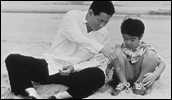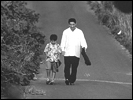Kikujiro
- Year
- 1999
- Original title
- Kikujiro no Natsu
- Japanese title
- 菊次郎の夏
- Alternative title
- Summer of Kikujiro
- Director
- Cast
- Running time
- 121 minutes
- Published
- 15 May 2001



by Jasper Sharp
Takeshi Kitano leads rather a double life. Seen over here as the maverick auteur whose stabs at revitalising the yakuza genre during the 1990s with such brutal works as Violent Cop (Sono Otoko, Kyobo ni Tsuki, 1989) and Boiling Point (3-4X Jugatsu, 1990) earnt him a great deal of success on the international circuit (not to mention some memorable appearances in Oshima's Merry Christmas, Mr. Lawrence and later in Robert Longo's Johnny Mnemonic), in his native land he still appears regularly on prime time TV under his primary incarnation as a comedian and all-round media mogul.
To the Japanese he will always be the same "Beat" Takeshi that played buffoon to "Beat" Kiyoshi's straightman for over a decade as part of the "Two Beats" (Tsuu Biito) manzai double act, his film work something he does on the side alongside the newspaper columns, the books, the records, the Office Kitano production company, the paintings, the restaurant chain...
Given this perspective, Kikujiro therefore came as quite a surprise to foreign audiences expecting something a little more in line with the director's previous work Hana-Bi (1998), which romped away with the Golden Lion Award at Venice, but given that some of the director's more typically idiosyncratic work such as A Scene at the Sea (Ano Natsu, Ichiban Shizuka na Umi, 1991) and Getting Any? (Minna Yatteruka?, 1994) were never that widely distributed outside of Japan, perhaps this is not so surprising. In this light perhaps Kikujiro can be seen as Kitano's attempt at introducing this other side of his showbiz persona to the rest of the world. More cynically, however, Kikujiro comes across as a rather compromised attempt to cash in on his festival success with something a little more whimsical and crowd pleasing, and taking a leaf out of Brazilian director Walter Salles' 1998 Academy Awards wildcard Central Station, what better way of bridging linguistic and cultural boundaries than by way of a road movie featuring a cute kid?
When the rest of the kids at school break up for their summer holidays, Masao (Sekiguchi), a young lad who lives with his grandmother, finds himself home alone. With nothing better to do, he sets off to visit his estranged mother in Toyohashi, whom he has not seen since he was a baby. Meanwhile when Kitano's clueless reprobate, the unemployed mobster wannabe Kikujiro, finds himself hanging around at a bit of a loose end too, he is sent off packing by his wife with 50,000 Yen in his pocket to escort the young scamp and make sure he is delivered safely. Straight away, the gruff and petulant manchild heads with his ward to the bike track and blows their entire budget for the trip, but money or no money, rather than return to face the wrath of his shrewish wife, the two press on regardless through a series of adventures that will change their lives forever.
To those more familiar with his oeuvre, with this lukewarm comedy Kitano almost seems like he's deliberately pandering to the acclamations of auteur status from the foreign press in his self-conscious rehashing of motifs and stylistic tropes from his previous seven films. With its picture postcard-like use of framing and long, economically unbroken takes, the director's hand behind the camera is permanently on show. The title, Kikujiro no Natsu (Summer of Kikujiro) harks back to his first attempt at capturing a life-changing summer in A Scene at the Sea, with numerous long shots of the young child trailing behind his guardian against a bright blue sky mirroring those from his earlier film. Towards the end the two camp out with a couple of affable bikers and partake in a series of childish games to entertain Masao (during which one of the bikers seems to be permanently naked) in a woefully over-extended sequence reminiscent of the yakuza's Okinawan beach games in Sonatine (1993).
Consisting of little more than a series of such skits, Kikujiro comes across as rather a vanity piece for its star. As usual Kitano makes for a charismatic and highly watchable anti-hero, naturally giving himself all the best lines, but the sullen infant has little to do but look cute and is all but relegated to a succession of reaction shots as he giggles at the loveable rogue's surly antics. A brief sequence featuring an encounter with a paedophile seems rather out of place amongst such breezy material, and attempts at rounding out Kitano's character with a sub-story involving a lapsed relationship with his own mother come too late to lend much in the way of pathos.
Kikujiro is not necessarily a bad film, though at two hours long the slight material seems rather over-stretched and it is only sporadically funny. For all its intentions at courting the mainstream, it remains a rather minor work amongst the rest of the Kitano canon and hardly indicative of its creator's talents.